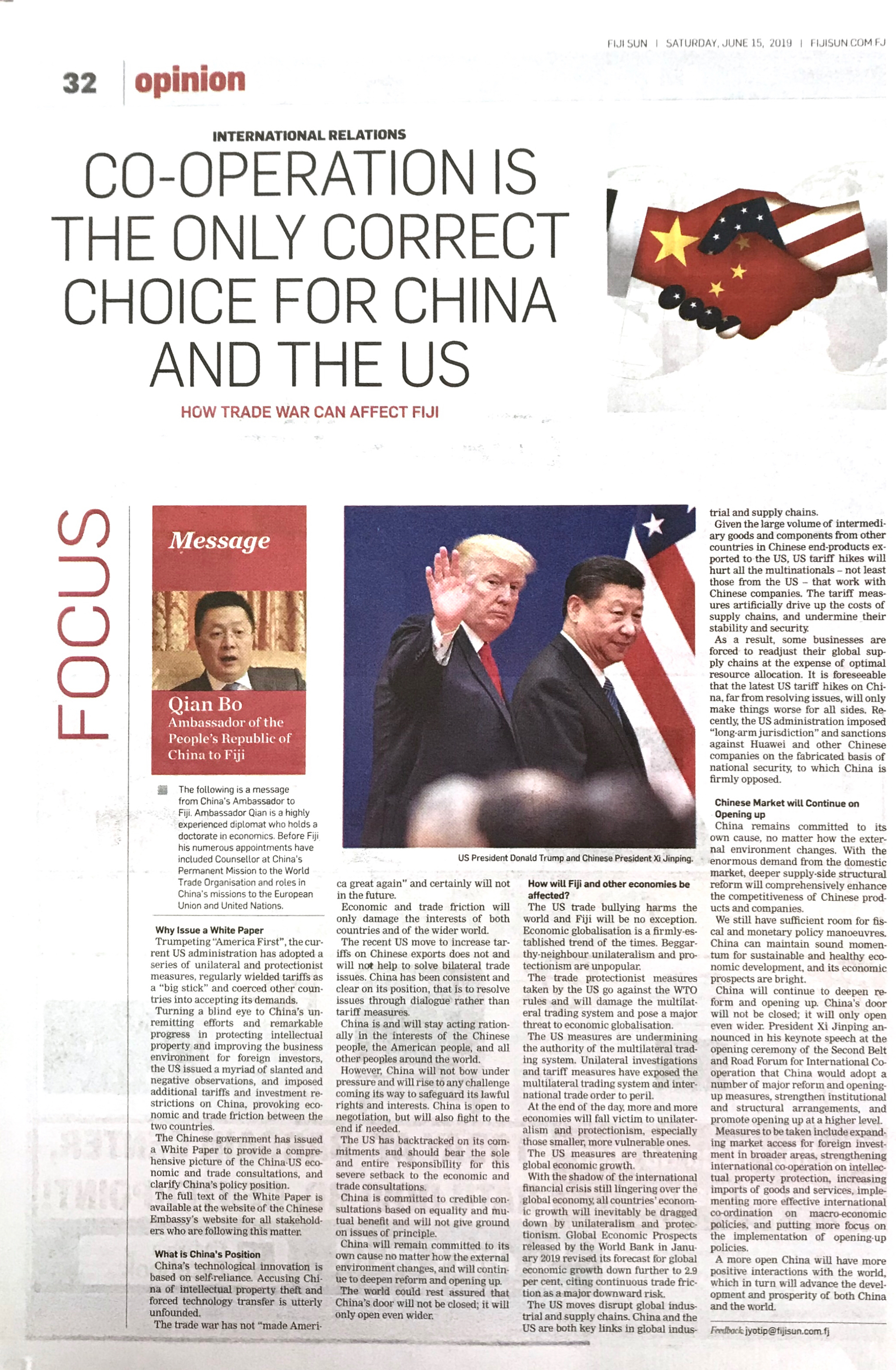On June 16, the Fiji Sun published an article by Ambassador Qian Bo entitled Cooperation is the Only Correct Choice for China and U.S.. The full text is as follows:

Why Issue a White Paper
Trumpeting "America First", the current U.S. administration has adopted a series of unilateral and protectionist measures, regularly wielded tariffs as a "big stick" and coerced other countries into accepting its demands. Turning a blind eye to China's unremitting efforts and remarkable progress in protecting intellectual property and improving the business environment for foreign investors, the U.S. issued a myriad of slanted and negative observations, and imposed additional tariffs and investment restrictions on China, provoking economic and trade friction between the two countries.
The Chinese government has issued a White Paper to provide a comprehensive picture of the China-US economic and trade consultations, and clarify China's policy position. Full text of the White Paper is available at the website of the Chinese Embassy's website for all stakeholders who are following this matter.
What is China's Position
China's technological innovation is based on self-reliance. Accusing China of intellectual property theft and forced technology transfer is utterly unfounded. The trade war has not "made America great again" and certainly will not in the future. Economic and trade friction will only damage the interests of both countries and of the wider world.
The recent U.S. move to increase tariffs on Chinese exports does not and will not help to solve bilateral trade issues. China has been consistent and clear on its position, that is to resolve issues through dialogue rather than tariff measures. China is and will stay acting rationally in the interests of the Chinese people, the American people, and all other peoples around the world. However, China will not bow under pressure and will rise to any challenge coming its way to safeguard its lawful rights and interests. China is open to negotiation, but will also fight to the end if needed.
The U.S. has backtracked on its commitments and should bear the sole and entire responsibility for this severe setback to the economic and trade consultations. China is committed to credible consultations based on equality and mutual benefit and will not give ground on issues of principle. China will remain committed to its own cause no matter how the external environment changes, and will continue to deepen reform and opening up. The world could rest assured that China's door will not be closed; it will only open even wider.
How will Fiji and Other Economies be Affected
The U.S. trade bullying harms the world and Fiji will be no exception. Economic globalization is a firmly-established trend of the times. Beggar-thy-neighbor unilateralism and protectionism are unpopular. The trade protectionist measures taken by the U.S. go against the WTO rules, and will damage the multilateral trading system and pose a major threat to economic globalization.
The U.S. measures are undermining the authority of the multilateral trading system. Unilateral investigations and tariff measures have exposed the multilateral trading system and international trade order to peril. At the end of the day, more and more economies will fall victim to unilateralism and protectionism, especially those smaller, more vulnerable ones.
The U.S. measures are threatening global economic growth. With the shadow of the international financial crisis still lingering over the global economy, all countries' economic growth will inevitably be dragged down by unilateralism and protectionism. Global Economic Prospects released by the World Bank in January 2019 revised its forecast for global economic growth down further to 2.9 percent, citing continuous trade friction as a major downward risk.
The U.S. moves disrupt global industrial and supply chains. China and the U.S. are both key links in global industrial and supply chains. Given the large volume of intermediary goods and components from other countries in Chinese end-products exported to the U.S., U.S. tariff hikes will hurt all the multinationals – not least those from the U.S. – that work with Chinese companies. The tariff measures artificially drive up the costs of supply chains, and undermine their stability and security. As a result, some businesses are forced to readjust their global supply chains at the expense of optimal resource allocation. It is foreseeable that the latest U.S. tariff hikes on China, far from resolving issues, will only make things worse for all sides. Recently, the U.S. administration imposed "long-arm jurisdiction" and sanctions against Huawei and other Chinese companies on the fabricated basis of national security, to which China is firmly opposed.
Chinese Market will Continue on Opening up
China remains committed to its own cause no matter how the external environment changes. With the enormous demand from the domestic market, deeper supply-side structural reform will comprehensively enhance the competitiveness of Chinese products and companies. We still have sufficient room for fiscal and monetary policy maneuvers. China can maintain sound momentum for sustainable and healthy economic development, and its economic prospects are bright.
China will continue to deepen reform and opening up. China's door will not be closed; it will only open even wider. President Xi Jinping announced in his keynote speech at the opening ceremony of the Second Belt and Road Forum for International Cooperation that China would adopt a number of major reform and opening-up measures, strengthen institutional and structural arrangements, and promote opening up at a higher level.
Measures to be taken include expanding market access for foreign investment in broader areas, strengthening international cooperation on intellectual property protection, increasing imports of goods and services, implementing more effective international coordination on macro-economic policies, and putting more focus on the implementation of opening-up policies.
A more open China will have more positive interactions with the world, which in turn will advance the development and prosperity of both China and the world.

 中文
中文 English
English